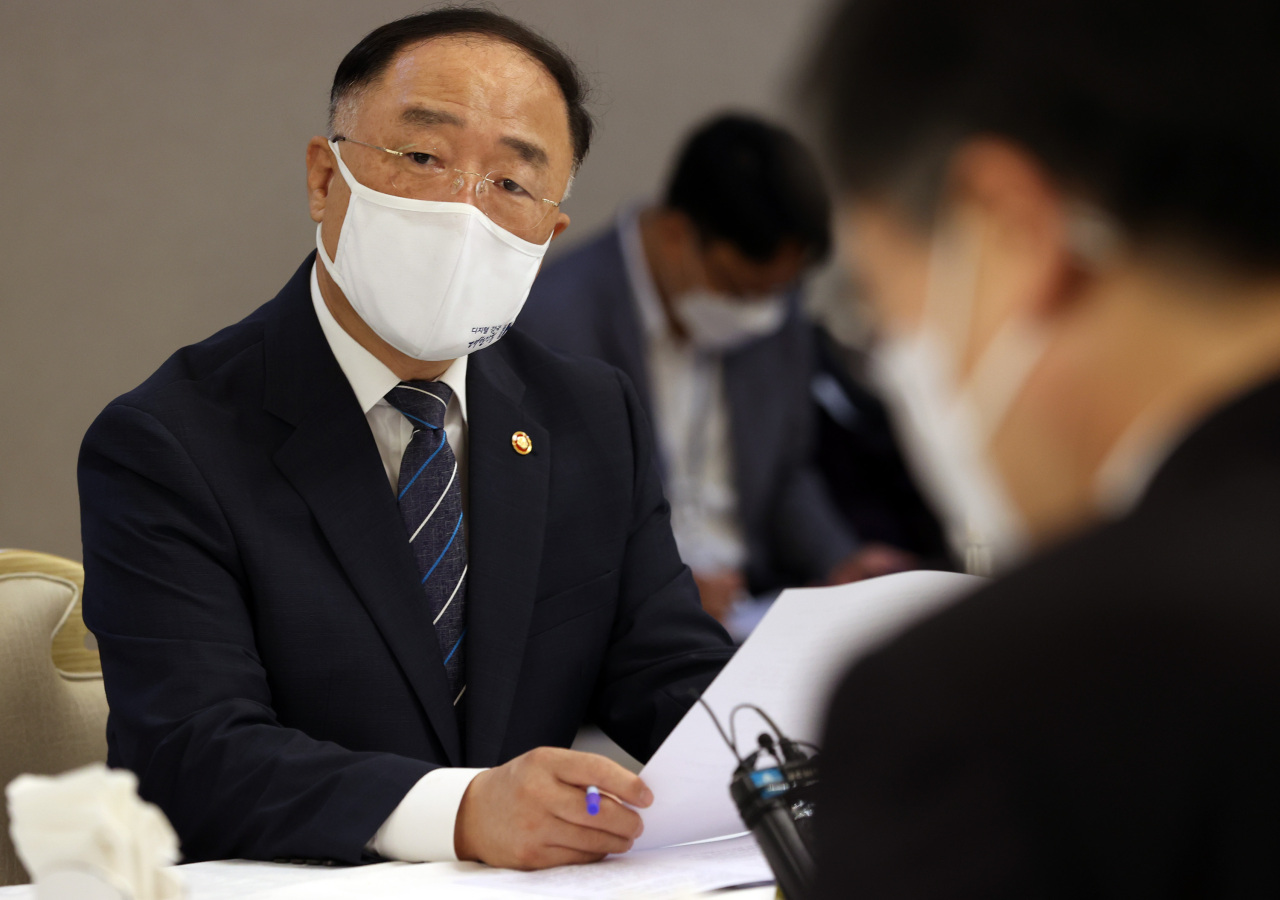S. Korea plans to spend W40tr on youth, ‘Korean New Deal’ next year
By Park Han-naPublished : Aug. 26, 2020 - 15:45

The government and ruling Democratic Party of Korea said Wednesday they will actively pursue expansionary fiscal policy next year, with plans to inject 20 trillion won ($16.9 billion) from next year’s budget into the “Korean New Deal” initiative and another 20 trillion won into youth support programs.
After a meeting at the National Assembly between the government and the ruling party on the 2021 budget bill, they decided to continue to expand government spending on projects to create jobs and reinvigorate the local economy amid growing uncertainties and the economic impact of the COVID-19 pandemic.
Finance Minister Hong Nam-ki said the government will make all-out efforts for an economic recovery, and that this year’s expansionary fiscal policy will continue through next year.
“We will try to draw up the budget supported by national finance as much as possible within the scope that the national system can manage,” he said.
The additional budgetary funds will be applied to the New Deal and used to strengthen employment, the social safety net and comprehensive measures to support young people and young job seekers.
As part of the New Deal, the government will spend over 20 trillion won on major future-oriented projects involving green energy, a data dam, green smart schools and future cars, according to Rep. Cho Jeong-sik, head of the party’s policy committee.
Cho said Korea is more fiscally sound than other major countries such as the US and Japan. “It is time to focus on creating a virtuous circle of improving the national debt ratio by making efforts for economic growth with bold fiscal input, which in turn leads to increased tax revenues.”
To revitalize the local economy, the government will issue shopping coupons and gift certificates worth a combined 15 trillion won that residents can use in their communities.
A total of 20 trillion will be earmarked Youth Hope Package Assistance -- designed to provide more job, housing and educational opportunities for workers with only a high school diploma. For example, it will include college tuition support.
Free high school education will begin next year, a year earlier than initially planned.
To bridge the information gap, 574 high-speed internet connections will be installed on islands and in isolated areas, and public Wi-Fi will be installed at 15,000 sites.
National health insurance coverage will be expanded to cover chest ultrasound exams, echocardiography and treatment for intervertebral disc disease.
The 2021 budget bill will be submitted to the National Assembly on Sept. 3 for approval.
By Park Han-na (hnpark@heraldcorp.com)







![[Graphic News] More Koreans say they plan long-distance trips this year](http://res.heraldm.com/phpwas/restmb_idxmake.php?idx=644&simg=/content/image/2024/04/17/20240417050828_0.gif&u=)
![[KH Explains] Hyundai's full hybrid edge to pay off amid slow transition to pure EVs](http://res.heraldm.com/phpwas/restmb_idxmake.php?idx=644&simg=/content/image/2024/04/18/20240418050645_0.jpg&u=20240419100350)






![[From the Scene] Monks, Buddhists hail return of remains of Buddhas](http://res.heraldm.com/phpwas/restmb_idxmake.php?idx=652&simg=/content/image/2024/04/19/20240419050617_0.jpg&u=20240419175937)

![[KH Explains] Hyundai's full hybrid edge to pay off amid slow transition to pure EVs](http://res.heraldm.com/phpwas/restmb_idxmake.php?idx=652&simg=/content/image/2024/04/18/20240418050645_0.jpg&u=20240419100350)

![[Today’s K-pop] Illit drops debut single remix](http://res.heraldm.com/phpwas/restmb_idxmake.php?idx=642&simg=/content/image/2024/04/19/20240419050612_0.jpg&u=)